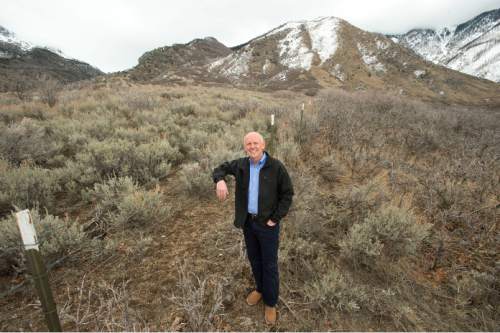This is an archived article that was published on sltrib.com in 2015, and information in the article may be outdated. It is provided only for personal research purposes and may not be reprinted.
A Utah County group's referendum drive to protect 100 acres of undeveloped land on the Alpine mountainside fell short in recent weeks, but with Alpine City Council members split on the issue, it's unclear how planned residential development will proceed.
We Decide Utah formed in response to the Utah County Commission's decision to rezone a piece of "critical environment" land on the Alpine foothills, gathering 16,086 signatures in 28 days — shy of the 17,885 needed to submit the decision to a popular vote.
Alpine Mayor Don Watkins acknowledged disappointment in the outcome, but added he was "amazed at the volunteer interest by our whole community."
Watkins is a vocal opponent of annexing the rezoned land and developing it under Alpine City's oversight, as preferred by county officials.
But he's on the opposite side of the issue from at least two city councilmen — both developers — who have pushed for annexation and development.
Council member Will Jones works with Pine Valley Realty and has lots in Fort Canyon, also located near the Alpine mountainside, and Roger Bennett developed Bennett Farms.
The two sent a letter to the county commission in November encouraging it to rezone the land and hand it off to the city for development.
"Cities will take responsibility when the county takes action that demands a response. It will plan the communities, or they will continue to try putting it on you," the letter said in part.
We Decide Utah activist Brian Hofheins, an Alpine resident who obtained the letter through an open-records request, said "I do believe that there's a little bit of a conflict of interest there."
Jones could not be reached for comment but Bennett said he has abstained from voting on past land matters that would affect his developments and said he had no personal interest in the property at issue. "I gain no benefit whether it's rezoned or not rezoned. If anything, it is a detriment to me because we'll have more lots out there for sale so it's competition for my lots. I think it's more important to do what is right."
He said he felt the land in question was only designated critical environment as a holding zone, not because it was proven to be critical. Most of the residents he has talked to have been in favor of the rezoning after he explained the issue to them.
"I know the mayor and some of them feel that they have the majority of the people but most of those people don't have the whole issue," he said. In my opinion, it's been a very one-sided view of what the whole situation is."
County Commission Chairman Larry Ellertson, the only returning member of the three-person board that approved the zoning change last year, said the letter was only one factor in the rezoning decision. "It was something that we looked at and recognized. …It was not, in my mind, a primary consideration."
If the city does not annex the land, Ellertson said the county will consider the development plans and the developer will bear the cost of providing the needed amenities that the city would normally provide. The county would then have to provide police and fire service, which Ellertson said is much less efficient than doing it on the city level.
We Decide Utah adviser Ron Madson said regardless of what happens with this particular development, the group has a plan for keeping zoning decisions close to the people. "We may have lost the battle, but we're going to win the war."
The group has compiled a database of the more than 16,000 citizens who signed petitions and is currently working on city- and county-wide initiatives to block further rezoning and development, he said. "The intent is to get Utah County out of the development business … and return exclusively to the cities the legislative decision as to whether to annex a particular piece of property and make any zoning changes out of critical environment," Madson said.
By putting the decision-making power in city hands, he said residents can easily overturn unpopular decisions.



